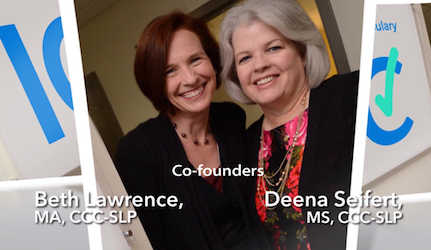2016 Chancelight Award Winner
InferCabulary
Revolutionizing Vocabulary Instruction
InferCabulary is an interactive, web-based K-12 literacy program that teaches nuanced vocabulary in a way that actively engages students in using critical thinking in a non-verbal domain.

How did you come to enter the EBPC?
My co-founder Deena Seifert and I were both Speech Language Pathologists specializing in literacy and reading issues. We’d known each other for years. In 2012, we found ourselves together in a class on integrating technology into work with students. Most of the technology and apps we reviewed in class were “cutesy” and not appropriate for older students. Our famous last words were ‘How hard could it be to build an app?’
Historically, vocabulary instruction involved introducing learners to definitions with the use of other words and expecting rote memorization. This is not ideal for students already struggling with vocabulary, because encountering a word once or twice in context gives a shallow understanding of the meaning and does not allow the reader to then correctly use the word in context. InferCabulary curates visual content to mirror what it’s like to encounter words repeatedly over months as if the child were an avid reader. It instantaneously gives students six to ten encounters, and then they infer the meanings by finding a common thread among related images.
We then met with experts at Johns Hopkins Hospital to gauge interest. They gave us a huge thumbs up, and that changed our lives.
We were speech pathologists with no business background in this totally new world, so we applied to Towson University’s TU Incubator in 2015 and to the Milken-Penn GSE competition in 2016. The EBPC is prestigious and comes with a cash reward, which is very helpful when you’re bootstrapping. It was a good way to show people who we were and the impact we were trying to make in education.
The competition was nerve-wracking and thrilling. The opportunity to share our baby with this prominent group of people was really wonderful. And then to win a prize was so fulfilling.
Can you tell us more about your enterprise?
One of the first things Deena and I did was to seek out independent research to test what we were doing. We wanted to know if we had something valuable. The University of Virginia did a study that is scheduled to be published in February 2019. Comparing quiz results of students given business-as-usual instruction, best-practices instruction and completely independent use of InferCabulary, they showed that kids using InferCabulary scored far higher on quizzes applying vocabulary in a new context every single week. The impressive results triggered a much larger study now being run at Virginia, Vanderbilt and American University with over 700 fourth graders in four states.
What business results are you finding with InferCabulary?
In 2016 when we were in the EBPC, we were still in development. Since then we have over 10,000 paid users and are in 100 schools, with district-level pilots in several states.
InferCabulary is visual and does not focus on the use of language to teach language to kids who struggle with language. This approach makes sense for a large variety of users. So we work with rural, urban and suburban public districts, second language-learning populations, Title I schools, private schools for kids with dyslexia or learning disabilities as well as top college prep schools. We also service a Montessori school in Hong Kong, a missionary school in Ecuador, and a school in Canada’s Northern Territory where they film Ice Road Truckers.
We’re proud that 98% of our customers from last year renewed and expanded their pilots this year. And we’re also excited to be in discussions with some potential distribution partners interested in what we’re doing and in helping us expand our reach.
What role has EBPC played in the Infercabulary story?
Prior to EBPC we had some organic growth. Schools we’d worked with in our private practices signed up for pilots, and we were beginning to be known in our area. When we went to Philadelphia for EBPC it propelled us to another level.
It’s prestigious to be chosen as a finalist to compete at the EBPC event and it’s an asset to have access to that network. We competed with people from around the globe and saying we’re winners of the Milken-Penn GSE EBPC has been invaluable.
Two years ago, we came back as judges and it was a great experience to see the competition from the other side. Seeing who was applying, learning about so many amazing, talented companies and then seeing how many people get weeded out you see how the finalists really are the cream of the crop. It’s impressive.
What advice would you give to aspiring education entrepreneurs?
Make sure your product or service solves a real problem in the classroom. Make sure you have an implementation plan. If schools buy it and it sits on the shelf and doesn’t get put to use, you’re not going to get brought back next year. I also can’t emphasize enough the need for research. It’s time-intensive to get independent researchers interested in what you’re doing, but the external validation is so valuable.
Learn more at InferCabulary.com
Editor’s note: Since their win, InferCabulary co-founders Beth Lawrence and Deena Seifert went on to create Communications APPtitudes, a suite of research-based testing and tools for educators, specialists and parents including their Test of Semantic Reasoning (TOSR).